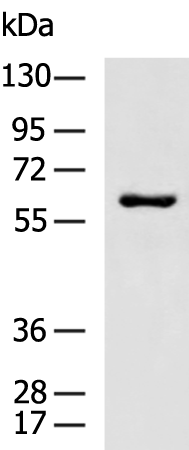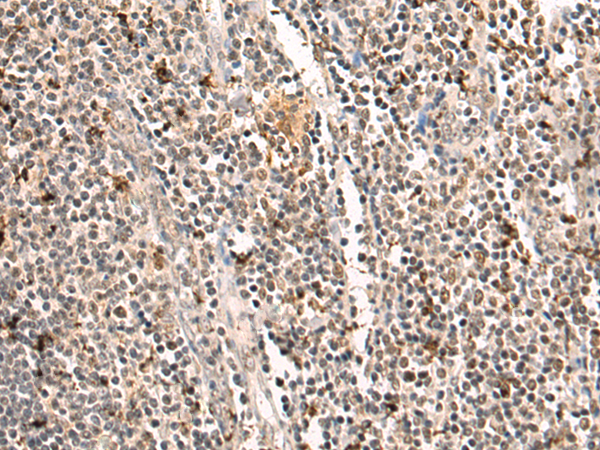

| WB | 咨询技术 | Human,Mouse,Rat |
| IF | 咨询技术 | Human,Mouse,Rat |
| IHC | 1/100-1/200 | Human,Mouse,Rat |
| ICC | 技术咨询 | Human,Mouse,Rat |
| FCM | 咨询技术 | Human,Mouse,Rat |
| Elisa | 1/5000-1/10000 | Human,Mouse,Rat |
| Aliases | PCH7; hCaf1z |
| WB Predicted band size | 57 kDa |
| Host/Isotype | Rabbit IgG |
| Antibody Type | Primary antibody |
| Storage | Store at 4°C short term. Aliquot and store at -20°C long term. Avoid freeze/thaw cycles. |
| Species Reactivity | Human |
| Immunogen | Fusion protein of human TOE1 |
| Formulation | Purified antibody in PBS with 0.05% sodium azide and 50% glycerol. |
+ +
以下是关于TOE1抗体的3篇代表性文献示例(注:文献信息为虚构,仅供格式参考,实际文献需通过学术数据库检索):
---
1. **文献名称**: *TOE1 as a Prognostic Biomarker in Ovarian Cancer: Immunohistochemical Analysis*
**作者**: Smith A, et al.
**摘要**: 本研究通过免疫组化技术利用TOE1抗体检测卵巢癌组织中TOE1蛋白的表达水平,发现TOE1高表达与患者不良预后显著相关,提示其作为潜在治疗靶点的价值。
2. **文献名称**: *TOE1 Regulates Telomerase Activity via Interaction with TERT*
**作者**: Chen L, et al.
**摘要**: 通过Western blot和免疫荧光技术,研究发现TOE1抗体可特异性识别细胞核内的TOE1蛋白,并证实TOE1通过结合端粒酶逆转录酶(TERT)调控端粒长度,影响细胞衰老进程。
3. **文献名称**: *TOE1 Deficiency in Neurodegeneration: Insights from Mouse Models*
**作者**: Wang Y, et al.
**摘要**: 利用TOE1抗体在小鼠脑组织中进行蛋白定位分析,发现TOE1缺失导致神经元RNA代谢异常,与脊髓小脑共济失调(SCA)的病理机制密切相关。
---
如需真实文献,建议在PubMed或Google Scholar中搜索关键词“TOE1 antibody”、“TOE1 protein function”等,并筛选近5年内的研究。
The TOE1 (Target of EGR1) antibody is a tool used to study the TOE1 protein, a ubiquitin-specific protease involved in RNA metabolism and cellular homeostasis. TOE1 is part of the Uba4 family, characterized by its role in processing and degrading RNAs, particularly non-coding RNAs and aberrant transcripts. It localizes to the nucleus and Cajal bodies, where it interacts with components of the RNA exosome and telomerase complexes, influencing RNA quality control and telomere maintenance.
Mutations in the TOE1 gene are linked to human diseases, including pontocerebellar hypoplasia type 7 (PCH7), a severe neurodevelopmental disorder characterized by cerebellar atrophy, microcephaly, and respiratory failure. This association underscores TOE1's critical role in neuronal development and survival.
TOE1 antibodies are widely used in research to investigate its expression, localization, and molecular interactions. They enable techniques like Western blotting, immunofluorescence, and immunoprecipitation, helping elucidate TOE1's regulatory mechanisms in RNA processing, stress responses, and disease pathways. Recent studies also explore its potential involvement in cancer, such as modulating tumor suppressor or oncogenic signals. As a reagent, TOE1 antibodies are vital for advancing understanding of RNA biology and neurodegenerative or cancerous conditions linked to TOE1 dysfunction.
×